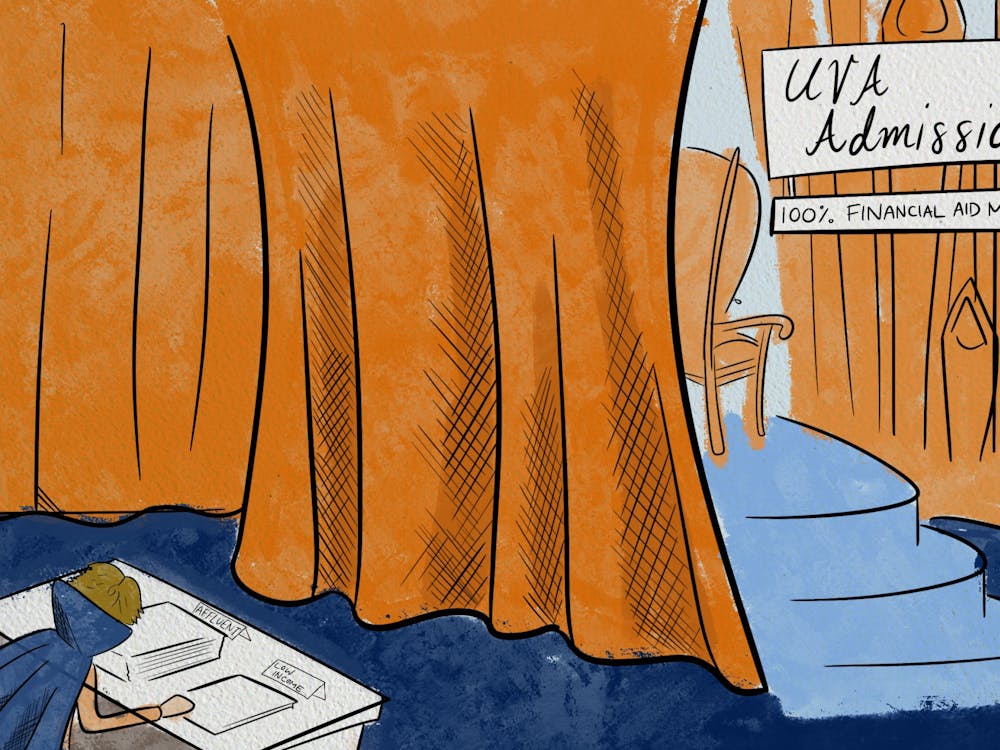Last month, University President Teresa Sullivan wrote a letter on behalf of former Gov. Bob McDonnell to the judge presiding over his public corruption case. Sullivan asked for leniency, pointing to the fact that McDonnell never pressured her to help him with his highly corrupt work for Star Scientific, even during one-on-one meetings. In the letter, she emphasized she was not writing in her capacity as president of the University.
There is little logic to the claim that simply because McDonnell didn’t pursue one particular avenue of corruption, he therefore deserves leniency. Moreover, the suggestion that an individual can truly be separated from his or her title — especially if that title is as prestigious as Sullivan’s — is faulty at best.
Sullivan herself feels the letter was appropriate. “I wrote [the letter] in my personal capacity; I do not stop being a citizen just because I am a president,” she said in an interview with The Cavalier Daily, during which University spokesperson Anthony de Bruyn was present. “It was not written on University stationery, I didn’t use any staff time in writing it. I did it myself. If there are typos in it they are mine.”
But though Sullivan says her letter was not an official statement on behalf of the University, the very first line of the letter reads: “My name is Teresa A. Sullivan. I am the President of the University of Virginia, the capacity in which I came to know Governor Robert D. McDonnell.” According to Sullivan, this was necessary in order to make her point that McDonnell deserved a lesser sentence: “I gave [the judge] the context about my position because it was relevant to the comment I was going to make about not having been contacted by the governor,” she said.
But the personal capacity in which Sullivan wrote this letter — and the personal capacity in which she claims to know the governor — both derive from her professional relationship with him. Her letter only carries weight given their professional interactions and the prestige of her title as our University’s president.
With the weight of her title behind her, Sullivan chose to use her position and influence to promote her own moral judgment about someone with whom she had a positive relationship. Sullivan noted that during the trial the media tended to group the University of Virginia in with McDonnell’s corruption charges, and argued that, given the number of University-related individuals subpoenaed in the case, she should have been asked about the nature of the former governor’s relationship with the University. As it stands, the jury never heard testimony of any kind or received any evidence from Sullivan. But since she was never subpoenaed, Sullivan, in writing this letter, essentially inserted evidence prior to sentencing without ever appearing in court — which is, at the very least, questionable.
Perhaps the worst element of this intervention is that Sullivan intervened on the wrong side of an ethical issue. McDonnell was found guilty of 11 counts of corruption and is now the first governor in Virginia history to be charged with a crime and the first to be convicted of one. The jury in his case found unanimously that he and his wife received immense financial support — $177,000 in loans and gifts — from Jonnie R. Williams Sr. in exchange for official acts that advanced Williams’ business interests. In response to the gravity of this conviction, the U.S. probation office recommended a sentence of at least 10 years and one month for McDonnell, with federal sentencing guidelines calling for a term between six and a half years and eight years and one month.
In Sullivan’s opinion, this punishment would simply be too burdensome for both McDonnell and the public. “If you think about what’s really punishment, so, a government official like this who’s convicted of a felony loses his public pension, and in this case he’s a lawyer [and] he loses his law license, and then the fact that you have been convicted even if you don’t ever serve a day is tremendously shaming to somebody who holds a high position like this,” she said. “Then to have the taxpayers pay for a long imprisonment didn’t actually to me make a great deal of sense. So that’s the reason that I encouraged leniency.”
Sullivan was careful to note that she was not questioning the jury’s finding. “I’m not necessarily saying the verdict was wrong; we do have a law in this state that says you have to report gifts and public officials also have to report loans and I understand that,” she says. But, aside from the conviction of guilt, she believes personal character should have an impact on sentencing. “I think in a case like this, it depends on what the charge is. And, it seems to me corruption is a charge that does go to character.”
When asked if McDonnell’s apparent choice not to implicate the University in his activities negates his corruption, Sullivan emphasized that “they’re separate matters.” But, given this line of logic, writing a letter on the governor’s behalf would be irrelevant to the case at hand.
Sullivan was clear that she chose to write the letter without influence from the governor or other people, saying she hadn’t spoken with the governor since graduation last year. The choice to write the letter was entirely her own, because, she says, “I felt that it was something of a matter of justice.” Of all possible cases of injustice to speak out on, it is disappointing that Sullivan felt compelled by this one.
On Jan. 6, U.S. District Judge James R. Spencer sentenced McDonnell to just two years in prison. We cannot know to what extent this decision was influenced by the more than 400 letters Spencer received in support of McDonnell. Sullivan notes that beyond writing the letter, she had no contact with the judge, nor did she attempt to. But even in a mass of 400 letters, Sullivan’s would stand out due to the prestige attached to her name.
Though Sullivan counters that judges are equipped to do so, it is nearly impossible to separate Sullivan’s official self from her personal self. And though Sullivan emphasizes she was not taking a partisan stance but rather a personal one rooted in justice, McDonnell is an inherently partisan figure. It may seem unfair to refuse a high-ranking official the opportunity to make statements in an unofficial capacity — but Sullivan only had the opportunity to make such a statement precisely because of her official capacity. Were she not our president, she would not have interacted with McDonnell (according to her, “lots of times”); were she not our president, she would not have a basis for her judgments about whether McDonnell deserves leniency; and were she not our president, her letter would have no discernible impact.
The irony of the incident is palpable — McDonnell used his political sway to promote something outside the bounds of his office, and Sullivan, though within her legal rights, used her influence to promote something outside the bounds of hers. We should expect and demand more from the person who represents our school.




